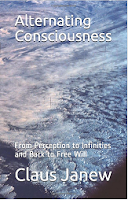Your individuality is much more than a little
peculiarity. It is a view that nothing and no one has but you. Otherwise
it/he/she would be you. Also, you will have changed your perspective - yourself
- in the next moment, and you cannot turn back time.
For convenience, we agree on "common" objects that are supposedly perceived by everyone, although everyone is looking at things from his or her own point of view. If you see me rolling a pen across the table to you, you may think it is the same pen that I see. But I see something completely different from what you see. There is not the slightest concord between my perception and yours. Otherwise, I would be sitting in your place, having your thoughts, memories, and feelings, and connecting them to a shape that is rolling toward me.
If you and I can speak of a single pen, it is because
we already agreed as children on what we would consider to be approximately a common object, or more
precisely, a pen. We have done the same for ourselves before, changing our own
perspective and noticing the relative permanence of certain shapes. If you now
notice that "someone" is rolling such an approximated object across
the table, you have again briefly changed your point of view, i.e. you have
roughly put yourself into his
perspective and returned to your own. So you can conclude that a common object is rolling, "only" seen
from different sides. In reality, however, you have merged two individual perceptions into a single unit, which emphasizes a
"part" of your own perception (pen) and, in addition, a
"part" of the perception of the other, which you have just
"spied out" (pen).
The unique perspectives thus create, through mutual
exchange, an approximate commonality,
a so-called real pen.
The widespread assumption that a pen is independent of perspectives, on the
other hand, leads into the void if one keeps asking "what it is made
of": of molecules, these of atoms, these of elementary particles, these of
fields, and these of laws of change. But change of what? It is an endless loop.
However, no
concept has yet been able to explain why a rolling pencil can be quite stable:
It does not break or change direction when I just think about it. I have to
touch it. And then it changes immediately for both of us (provided we are both
looking "there").
In the Perspective Exchange Concept, therefore, we
must assume that largely unknown (unconscious) processes stabilize our
perception. Their effect must be in accordance with proven physical
regularities. Both conclusions are consistent.
The concept of an independent reality, on the other
hand, is a crutch that is used to project
stability into objects that are not really understood, thus largely hiding individual perceptions within
them. This is not consistent.
Alternating Consciousness. From Perception to Infinities and Back to Free Will

